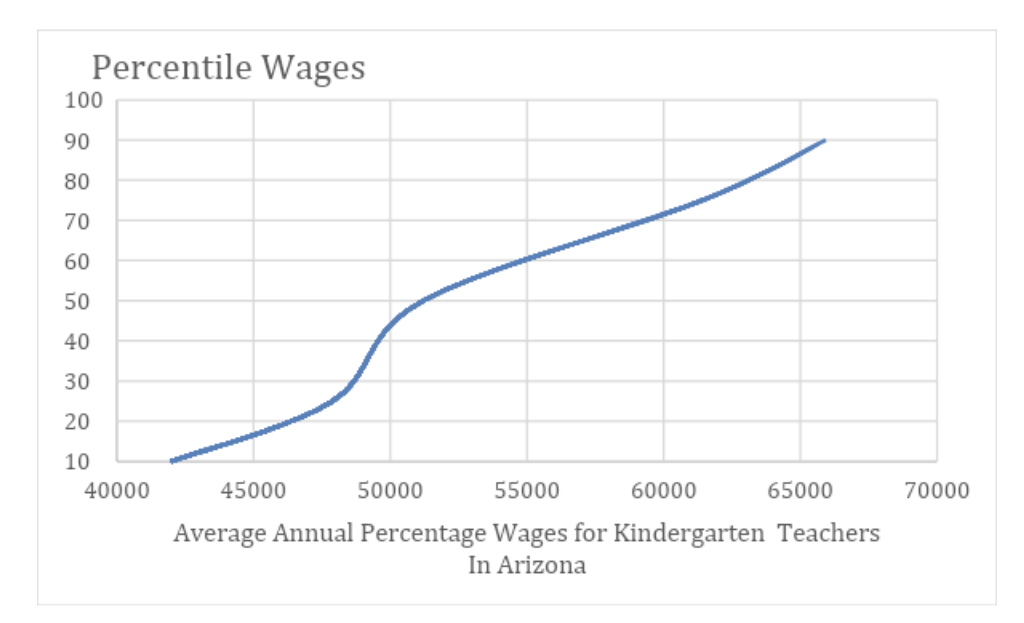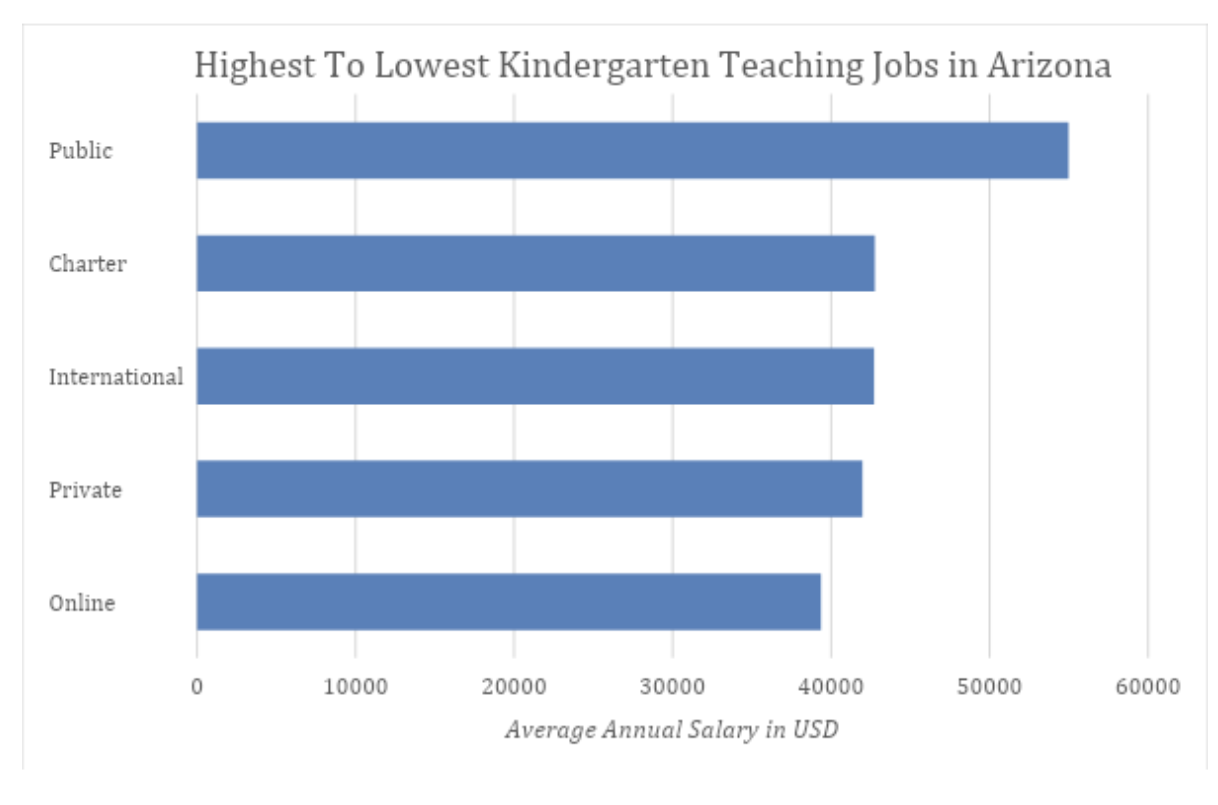Kindergarten teachers are tasked with integrating students into elementary school. It is a nurturing and varied role, requiring educators to introduce curious children to the fundamental building blocks of learning and guide them on social skills. Arizona is critically short of quality teachers and needs more passionate and caring individuals to enter the vocation.
The average kindergarten teacher salary in Arizona as of May 2023 was $54,980. Salary ranges can vary widely depending on the city and many other important factors, including education, certifications, additional skills, and the number of years you have spent in your profession.
In this guide, Teachers of Tomorrow will examine Arizona’s kindergarten teaching salaries in various educational settings. We’ll also outline Arizona’s steps to becoming a certified kindergarten teacher, including alternative teacher certification options.

What Is a Kindergarten Teacher?
Kindergarten teachers teach students who are at least five years old as of September 1st of that school year and may be as old as seven. For many children, kindergarten teachers are their first encounter with a professional educator and formal schooling. Thus, these young students are embarking on an exciting period of transition and discovery.
Kindergarten teachers are responsible for introducing students to the foundations of learning and help develop social skills. The curriculum is varied, including developing fine motor skills and emotional regulations, learning how to wash hands, take turns, and share, while introducing math, reading, and writing fundamentals.
Teaching kindergarten is a dynamic profession where good knees can come in handy, although not a must. The students are incredibly active and curious yet still need a great deal of emotional support, patience, and encouragement. Thus, classroom management strategies must take into account the children’s unique needs, both physical and emotional.
Excellence in kindergarten teachers is diverse. However, quality educators of this age group share some skills:
- Planning: A classroom of kindergarteners is busy, but that doesn’t mean it is unmanaged chaos. Excellent educators of this age group are highly organized and think ahead, ensuring engaging activities and lessons are balanced with breaks that respect the students’ needs while ensuring the curriculum is met.
- Speaking clearly with supportive body language: Kindergarteners are still developing their language and listening skills. Some are also growing up in multi-language households. Students in this age group respond best to instructions and lessons given using enunciated words backed by expressive facial and body gestures. Successful educators of this age group also understand the difference between projecting their voice and being loud. The former is necessary for students to clearly hear their teacher but the latter can upset young people, creating anxiety and stress.
- Quick thinking: All successful kindergarten teachers can handle the unexpected without being rattled. Their fast and flexible thinking allows them to shift with the moment and keep the classroom atmosphere safe, warm, and productive. They also can revise their plans on the spot, adapting them to fit students’ needs, attitudes, and aptitudes.
Being a kindergarten teacher is a unique career where glitter gets everywhere, and students frequently overshare. But the profession’s demands go well beyond crafts and listening to tall tales. Some of the many responsibilities of kindergarten teachers include the following:
- Developing and maintaining a clean, nurturing, safe, and productive classroom.
- Create and implement engaging lessons and activities that meet the curriculum guidelines and address student’s emotional, social, and cognitive development
- Monitor students throughout the day to ensure everyone is safe and, when necessary, step in to help children resolve their differences.
- Observe students’ progress and communicate necessary developments or concerns to the appropriate parties, including guardians, therapists, and other relevant educators.
How Much Do Kindergarten Teachers Make in Arizona?
The average annual salaries for kindergarten school teachers in Arizona as of May 2023, according to the Bureau of Labor Statistics:
- Highest salary – $65,930
- Average salary – $54,980
- Lowest salary – $41,920
Kindergarten teacher salaries in Arizona vary depending on a school’s location and a teacher’s years of experience, education level, certification, and additional skills.

How To Become a Kindergarten Teacher in Arizona
The steps to become a certified kindergarten teacher vary throughout the United States. In Arizona, the state’s requirements are overseen by the Arizona Department of Education (ADE). Candidates on the traditional pathway must complete the following steps:
- Complete a bachelor’s degree. A bachelor’s degree is required to teach kindergarten in Arizona, as it is throughout the United States. Recommended majors include Early Childhood or Elementary Education.
- Complete an ADE-approved teacher certification preparation program. Candidates at college or university can take a 12-week student teaching program or one that includes a capstone teaching project. Which route a traditional candidate takes depends on their institution and circumstances.
- Pass the Arizona Educator Proficiency Assessments (AEPA). All teaching candidates should consult the AEPA website to ensure they register for the correct exams. Alternatively, consult the ADE educator certification pages for Early Childhood or Elementary Education.
- Pass a background check. An Arizona DPS IVP Fingerprint Clearance Card is required to submit a certification application to the ADE. The process takes about ten days for candidates with no criminal history record. Those with a criminal history may take up to 30 business days. The process is necessary to ensure the safety of students and staff.
- Apply for an Arizona teaching certificate. Applicants will need to submit the application, pay a fee ($60 as of May 2024), provide the AZDPS IVP Card, official transcripts, proof of passing exam scores, and, if relevant, Verification of PreK-12 Teaching Experience form.
Alternative Route to Certification for Kindergarten Teachers
The ADE offers an Alternative Teaching Certificate (ATC) for candidates with a bachelor’s degree but not on the traditional pathway. The certificate is valid for two years and may be renewed twice for an additional year, providing a total of four years.
To qualify, a candidate must complete the following steps:
- Have a bachelor’s degree. The candidate must have obtained the degree from an accredited institution. However, it does not have to be education-focused.
- Apply to an Alternative Certification Program (ACP). Some programs, like Teachers of Tomorrow, are free to apply.
- Obtain an AZDPS IVP Card. Like candidates on the traditional route, a background check must be completed to ensure there is no criminal history that would disqualify a candidate from teaching.
- Pass any necessary pre-teaching exams. Some exams may be required before applying for the
- Apply for the ATC. Candidates must submit an application, a valid copy of their IVP CARD, proof of passing exams, and proof of being enrolled in an approved ACP.
- Complete coursework and pre-class training. Coursework can often be conducted while waiting for the Alternative Teaching Certificate approval. The length of the programs varies, typically 6-12 weeks. Some, like Teachers of Tomorrow, are self-paced, and others follow a schedule.
- Teach. Alternative teaching programs allow candidates to teach for pay instead of doing an unpaid internship. Many ACPs provide coaching and mentorship during a candidate’s first year of teaching.
- Pass any additional exams. You may need to take additional exams before applying for full certification.
- Apply for full certification. Once candidates have completed their ACP coursework, teaching experience, and exams, they can apply for full certification. Full certification widens job opportunities and can lead to higher pay.
What is the Highest and Lowest Paying Kindergarten Teaching Job?
As a certified kindergarten school teacher in Arizona, you can work in various settings:
- Public schools: The highest salaries for kindergarten teachers are found at public schools. However, location plays a huge role in a school’s budget. Smaller schools in remote areas will pay less than districts in affluent, high-population areas.
- Charter schools: Arizona charter schools are funded through state taxes and are free for students to attend. However, their teacher salaries are generally slightly lower than public schools.
- International schools: International schools in Arizona offer incredibly competitive salaries, sometimes even paying more than charter schools. The best salaries are often offered to teachers fluent in more than one language.
- Private schools: Arizona’s private schools’ salary ranges vary from some of the worst to the best in the state. How much a teacher is paid is heavily dependent on the tuition fees, as these educational institutions rarely receive any state funding.
- Online teaching: Virtual teaching in Arizona is generally paid less, but there are higher salaries for those qualified to work with students with disabilities like autism. In addition, these positions offer the most flexible hours and schedules.

At Teachers of Tomorrow, we strive to help talented individuals become the best teachers in their state. Contact us today and begin your journey in a fulfilling and rewarding vocation that makes a difference.
Related teaching careers
How to Become a Preschool Teacher
Online Teaching Jobs from Home
How to Become a Substitute Teacher in Arizona
Related Articles
The 10 Main Challenges of Becoming a Teacher in 2024
What Does a Kindergarten Teacher Do: Requirements and Skill Sets
How Much Does an Elementary School Teacher Make in Arizona?


